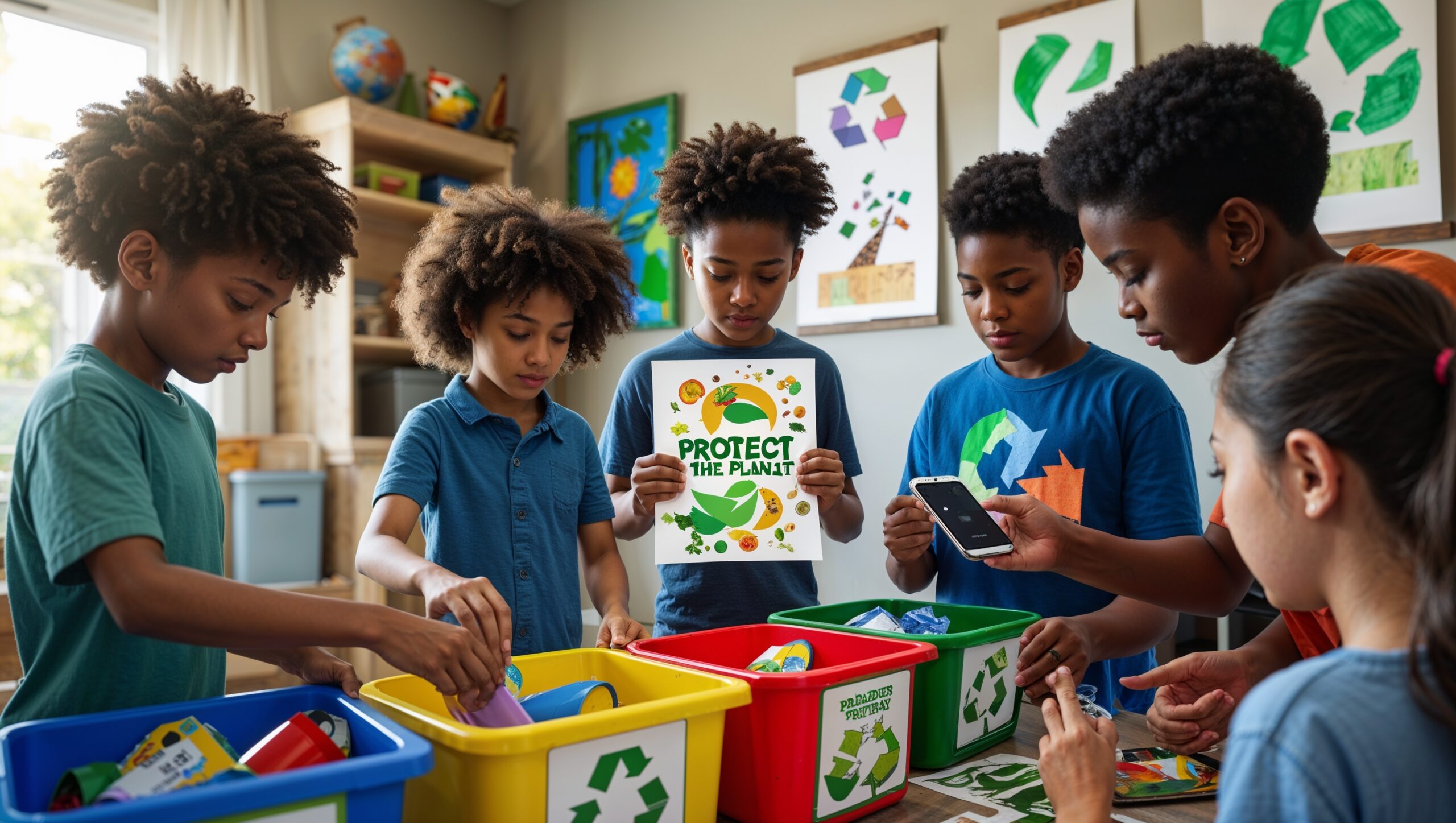Raising eco-conscious kids starts with conversations — not just rules. Children and teens are naturally curious and care about the planet. When we teach them why recycling and sustainability matter (not just how), they’re more likely to build lifelong green habits.
In this article, you’ll learn age-appropriate strategies to teach kids and teens about waste, recycling, and sustainable living in ways that are positive, empowering, and fun.
Why It’s Important to Start Early
Habits formed early in life are often the ones that stick. Teaching kids about sustainability:
- Builds responsibility and empathy
- Encourages critical thinking
- Helps them understand real-world systems
- Gives them tools to take action and make an impact
And with climate anxiety rising among youth, these conversations offer hope and empowerment, not fear.
1. Keep It Simple for Young Kids (Ages 3–7)
Young children learn best through hands-on activities and repetition.
✅ Try:
- Color-coded recycling bins with pictures
- Sorting games with clean items (plastic vs. paper)
- Singing a “Reduce, Reuse, Recycle” song
- Storybooks with sustainability themes
- Watching short cartoons or nature videos about the environment
🗣️ Use phrases like:
- “We recycle to help the Earth breathe.”
- “Let’s give this bottle a new life.”
- “Trash goes here, treasures go there.”
Make it fun, visual, and part of their everyday routines.
2. Add Depth for Kids (Ages 8–12)
At this stage, kids can begin to understand cause and effect.
✅ Activities:
- Visit a recycling center or compost facility
- Do a “waste audit” at home to see what’s being thrown away
- Create crafts from recyclable materials
- Grow a small garden using composted food scraps
- Assign eco-responsibilities like “bin captain” or “lunchbox inspector”
💡 Start asking questions:
- “What happens when we throw things away?”
- “How do animals feel when there’s trash in nature?”
- “What can we do with this instead of throwing it away?”
Encourage them to ask their own questions — and explore answers together.
3. Make It Relevant for Teens (Ages 13+)
Teens want to feel heard and empowered — not lectured. Appeal to their desire to make a difference and tie sustainability into their interests.
✅ Ideas:
- Watch documentaries together (like Kiss the Ground, The True Cost, or Plastic Ocean)
- Encourage them to follow eco-influencers or climate scientists on social media
- Help them start or join a sustainability club at school
- Let them design their own recycling station at home
- Support passion projects (zero-waste challenges, thrift flipping, etc.)
🧠 Discuss topics like:
- Climate change and social justice
- Fast fashion and ethical consumption
- Tech recycling and e-waste
- Sustainable careers and innovation
Teens respond well to real-world applications and open dialogue.
4. Lead by Example
Kids of all ages watch what adults do.
✅ Practice what you preach:
- Rinse and sort your recyclables
- Use reusable bags and containers
- Compost food scraps
- Repair instead of replacing
- Talk openly about the choices you make
When kids see your values in action, they internalize them as normal.
5. Celebrate Small Wins
Positive reinforcement builds momentum.
🎉 Celebrate:
- A week with no single-use plastics
- A successful recycling drive
- Planting a tree or growing herbs
- Making an eco-friendly lunch or outfit
Recognize effort, not just outcomes — and let kids take the lead whenever possible.
6. Use Media, Books, and Games
There are many resources designed to make sustainability fun and accessible:
📚 Books:
- The Lorax by Dr. Seuss
- One Plastic Bag by Miranda Paul
- What a Waste by Jess French
- Ada’s Violin by Susan Hood
🎮 Games & Apps:
- Recycle Hero
- Earth Rangers
- Gro Garden
- Trash Sorting Puzzle (interactive apps)
🎬 Shows & Videos:
- Octonauts
- Our Planet
- Curious George Recycles
Use screen time as a tool for inspiration and education.
7. Encourage Action, Not Perfection
Teach kids that sustainability is about progress, not perfection.
🗨️ Say things like:
- “Every small choice adds up.”
- “It’s okay to make mistakes — we just try our best.”
- “We’re learning together.”
Avoid shaming or overwhelming them with guilt. Instead, focus on curiosity, kindness, and care for the planet.
Raising a Generation That Cares
Kids and teens are powerful changemakers — when given the knowledge, tools, and encouragement. Start small, be patient, and make the journey joyful.
Because when children grow up understanding how the world works — and how to protect it — they don’t just recycle.
They reshape the future.
